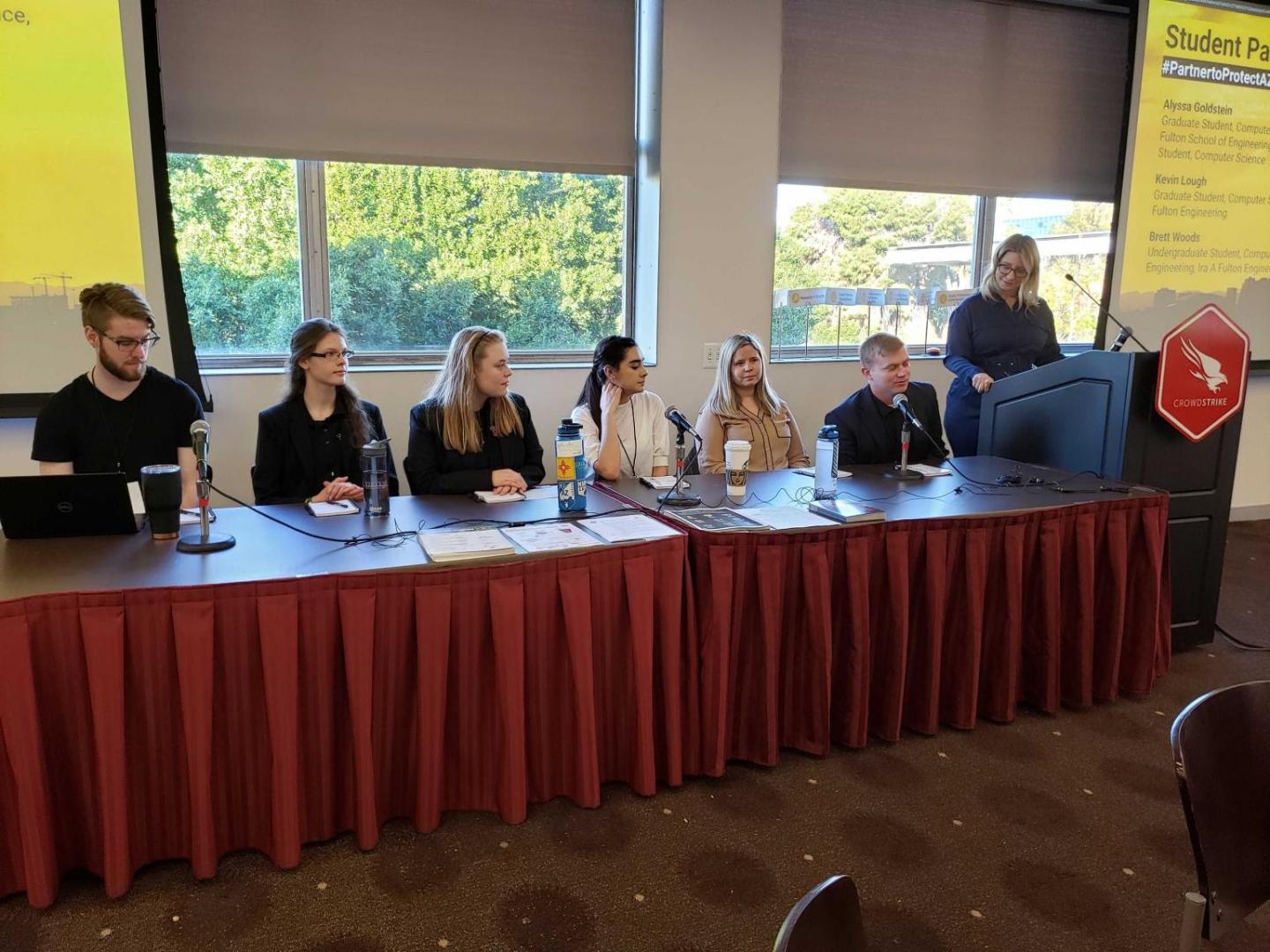Partner to Protect AZ Unconference Amplifies Next-Gen Voices in Shaping the Future of Cybersecurity

As a gathering of cybersecurity professionals from across the state and beyond, the Partner to Protect AZ Unconference, hosted by the University Technology Office at ASU and industry partner CrowdStrike, demonstrated a new, vibrant way to bring security solutions to life. Illuminating a diverse array of visions and opinions, one of the big key themes of the day was fittingly the need for inclusion and equity in the cybersecurity field. This community of technology and security professionals has an opportunity to lead the way.
A student panel that kicked off the day sparked ideas that continued to gain momentum throughout the Partner to Protect AZ Unconference. Many of the topics that each of the five students brought forth connected to the six teams that emerged from the unconference, which broke into groups at tables across the conference center and utilized flipcharts, drawings and notes to communicate their ideas. Excited and driven conversation defined the entire event.
Those conversations resulted in inspiring action. An unconference takes the traditional conference format and breaks down silos and formalized proceedings, allowing participants to “choose their own adventure” based on shared affinity and with some moving out of their comfort zones. The pace of the day was therefore determined by attendees and their passions for six key themes, “pitched” by emerging facilitators.
A great example of the flexibility of the unconference format was the synthesis of two working groups into one, more unified focus, bringing the planned seven topics down to six. This wasn’t a reduction in thinking or work, however, as the Research and Grants theme was deemed a facet of the Shifting Public Perceptions theme. Participants ultimately and eagerly worked to realize aspirations and goals, even if some of what can be accomplished now are small, but important, steps.
Two of the students on the panel, who are sophomores at Paradise Valley High School, raised potential solutions for the Equity + Inclusion theme, beginning with the levels of education. “We need diversity in this field,” Oceana Covington said. “You don’t just have to be in the ‘nerdy group,’” her peer Megan Howell added.
This conversation echoed in the Equity + Inclusion working session, which highlighted the need for consideration of where people are being left behind: geographically, economically, socially and culturally. To fill the gap between cybersecurity supply and demand (another reality of the field that came up again and again), the group proposed an early measure. Video content that appeals with details on the high income the cybersecurity field can offer, and provides information on how differing education tracks can still lead to the industry, was the team’s initial solution.
But there’s still work to be done at an educational level. “There is a lack of introduction to this field at the earlier ages,” Kevin Lough, computer science graduate student at ASU, said. The Ongoing Education + Training working group identified the need for conversations about cybersecurity, starting with the parents of children in elementary school; their children are increasingly exposed to technology at an early age.
High school sophomore Howell mentioned during the student panel, too, that material and courses dedicated to coding and cybersecurity should be better integrated into the curriculum at those ages. This, Howell explained, would open a wider career pipeline to attract the talent necessary for the ever-growing cybersecurity industry.
However, as ASU computer science graduate student Alyssa Goldstein added, cybersecurity is not entirely filled with techies. “Skills of the future are ever-changing, just like cybersecurity,” she said. “The biggest skill is the ability to communicate...Anyone can be taught the tech skills, but it’s the soft skills that are so important.”
Focus was also pulled towards the need for training and awareness outside of the technology fields, and even for employees that work within it. A team dedicated to shifting public perspective found that campaigns challenging widely held myths could lead to fewer breaches. As Lough put it, “If you get education and awareness, it can affect every department in the company.”
A report on effective ways to build communities and partnerships between governments, business and educational institutions appropriately closed the day, as participants from each of those realms concluded with new and strengthened connections to build Arizona’s cybersecurity field to greater heights.
UTO, CrowdStrike and state-wide cybersecurity professionals are excited to continue working together and keeping the conversations going in a dedicated Slack channel, #asu-cybersecurity-community. In addition, they are planning for the unconference to be an annual convening.